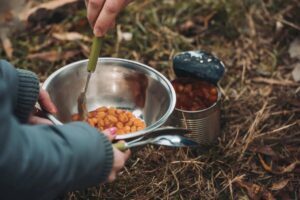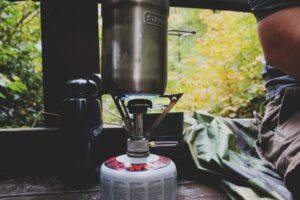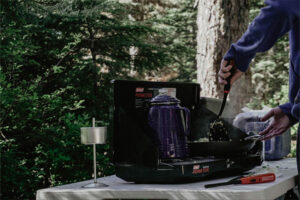
Non-perishable foods are those that have a long shelf life and can be stored at ambient temperature. Non-perishable foods are useful for camping since they may be stored for an extended amount of time without spoiling.
Benefits of non-perishable food items
Non-perishable meals may appear to be inferior to well-cooked delicious foods that leave your taste receptors wanting more. After all, you want to fill up on tasty and satisfying meals that will make your camping trip even more enjoyable, without the uncomfortable desires caused by a bad meal.
Fortunately, these options come with a few advantages. Here are some benefits of non-perishable food you should be aware of:
Convenience: No fridge or cooler? Not a problem! Non-perishable meals do not require refrigeration, so you will not have to worry about them going to waste.
Saves time: Let’s be honest: the last thing you want to do when you get up early on a camping vacation is cook for others, especially if you have children running about the campground. Non-refrigerated meals allow you to devote your time to other pursuits.
Healthy and nutritious: Non-perishable foods are not only healthy, but they also include high quantities of protein, vitamins, and minerals. For example, dried fruit is high in fibre and may be eaten as a fast snack.
Versatility
On your camping vacation, eat a nutritious, well-balanced meal that includes nonperishable foods. They can assist prepare a wide range of cuisines, from small snacks to elaborate feasts.
Cost
The best non-perishable food for camping may be purchased in quantity, making it very economical. These goods have extended shelf life; therefore, they may be acquired in bulk at a low cost. Non-perishable foods are less costly than perishables.
Reduced Risk of Food Spoilage
Nonperishable foods are less prone to spoilage than perishable foods. This is owing to their low water content, which renders them less prone to bacterial development. You don’t want to open a food item when camping just to discover that it’s rotten. Depending on how isolated your camping is, you might be out of luck! Sticking to non-perishable foods lowers this danger.
Tips for choosing the best non-perishable foods for camping
When selecting the best non-perishable meals for camping, you should examine nutrient composition, cooking utensils, and components to avoid. Here are five suggestions for your next pre-camping shopping excursion.
Choose Nutrient-Rich Foods
When camping, you often relax before or after engaging in exciting outdoor activities. It’s critical to nourish your mind and body with the right nutrition.
Nutrient-dense meals include vitamins, minerals, and other essential elements while being low in saturated fat, sugar, and salt. Look for fruits, vegetables, whole grains, low- and non-fat dairy, nuts, lean meat, and poultry.
Limit Processed Foods
Processed foods are heavy in sugar, salt, and fat. This is why it is recommended to restrict processed meals.
Overeating these meals may cause us to feel unwell. Processed meals lack fibre, which can cause constipation and make us feel hungry even after eating a lot. Furthermore, consuming too much sugar, salt, and fat on a daily basis might result in long-term health concerns.
Consider Your Cooking Setup
What you can deliver is determined by your ability to prepare it. Cooking is the greatest way to enjoy nonperishable foods while camping! Having the necessary foods to create a hot dinner might improve your camping experience.
It is also necessary to consider kitchenware. When creating your grocery list, remember to include items like can openers, long spoons/ladles, and basic kitchenware.
Read the Label
The best part about nonperishable foods is that they are shelf-stable and last for years. Check the expiration date on anything in your cupboard before adding it to your camping food bag.
It is also advisable to examine the label for nutritional facts. Knowing exactly what nutrients you’ll be getting on your camping trip can help you plan it with your health and well-being in mind.
Pack Properly
Keep your food fresh and pest-free by storing it in sealed containers! If you’re traveling canned foods, be careful of the cans and avoid any with dents, rust, or swelling.
Keep your non-perishable food in a cool, dry area. A shaded area, whether natural or man-made, is ideal for storing food when camping. Fresh foods should be kept in an ice-filled cooler.
List of the Best Non-perishable Foods for Camping
The best non perishable foods for camping can be used for many different meals, have a good nutrient base, and taste great! Here are some of the best shelf-stable items to bring camping.
Breakfastt
- Bagels with cream cheese
- Cereal with powdered milk
- Instant oatmeal
- Honey or syrup
- Banana bread
- Peanut butter wrap
- Pre-cooked bacon
- Fresh fruit (e.g., apples, oranges, watermelons).
- Honey for tea or coffee
- Toast with peanut butter
- Homemade or store-bought muffins
- Tortillas
- Breakfast-style potatoes
- Powdered eggs
- Cinnamon toast crunch
- Breakfast burritos
- Avocado toast
- Protein shakes
Lunch
- Wraps with canned tuna or chicken
- Cheese and crackers with dried fruits
- Peanut butter and jelly sandwich with dried fruit, granola, or nuts
- Protein bar with dried fruits and meats
Dinner
- Spices (e.g., salt, pepper, sugar, cinnamon).
- Pasta with premade sauce
- Campfire nachos
- Soup mixes
- Pre-packaged backpacking meals
- Campfire baked potato
- Chili potatoes
- Cured ham
- Chicken tortillas
- Instant noodles
- Dry yeast
- Dry lentils with beans
- Ramen
- Baked beans
- Canned chili
Conclusion
Packing and cooking nonperishable foods for camping vacations is both simple and cost-effective. Non-perishable food is ideal for camping and trekking due to its variety and low danger of spoiling. As long as you have the necessary tools and equipment, you can make a variety of nutritious and tasty camping meals with nonperishable food products.





